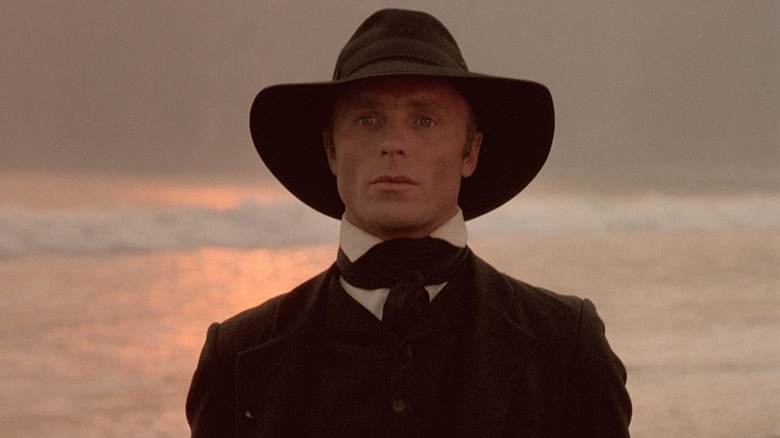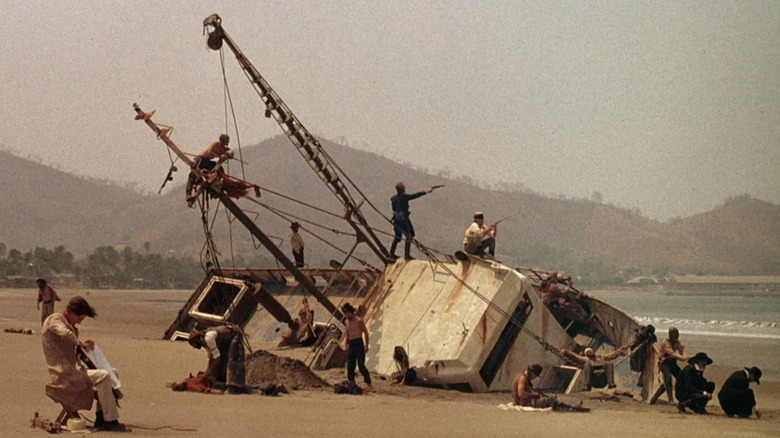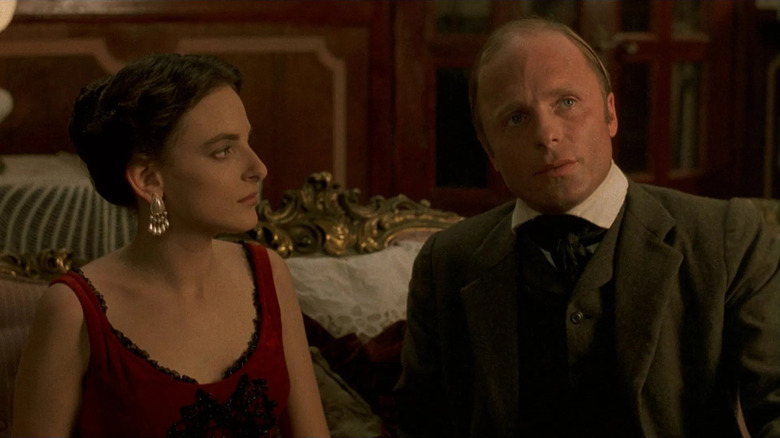Future director Alex Cox moved from his native England to Los Angeles in 1977 because he found the British film scene to be lacking. While attending UCLA, he made his first short, “Edge City,” a bitter, talky, semi-surrealist film about struggling artists wandering the uglier parts of the city, having conversations about the nature of artistic success. (“Edge City” is on YouTube.) That short led to a plum deal with Mike Nesmith (of the band The Monkees), who secured over a million dollars for Cox’s first feature, 1984’s “Repo Man,” a seminal film of the punk rock scene and a legit cult phenomenon. “Repo Man” wasn’t initially a hit, but its soundtrack (full of L.A. hardcore) sold so well that it was re-released, becoming a financial success.
Advertisement
Cox came to love punk rock, already somewhat embodying its spirit in his outsider view of filmmaking. In 1986, the filmmaker made “Sid and Nancy,” a raucous biopic about the Sex Pistols’ Sid Vicious (Gary Oldman) and his violent relationship with Nancy Spungen (Chloe Webb). That film was critically lauded at the time, and is still beloved to this day. Both “Repo” and “Nancy” are considered vital works in the punk cinema canon.
In 1987, however, Cox’s growing relationship with Hollywood came to a crashing halt. He made the critically panned and unsuccessful “Straight to Hell,” a modern remake of the spaghetti Western “Django Kill … If You Live, Shoot!” The film has a cult following today, largely because the cast included musicians like Courtney Love, Joe Strummer, Elvis Costello, and Grace Jones. (Director Jim Jarmusch also appears.) But at the time, no one liked it. That same year, Cox directed “Walker,” a biographical Western about William Walker (Ed Harris), a crazed revolutionary who once inserted himself into the presidency of Nicaragua. It had a budget of $6 million, Cox’s largest to date.
Advertisement
But it was deemed too political and too violent for Universal, and the studio decided not to promote the movie. When it made only $300,000 at the box office, Cox was officially disillusioned.
Walker is an aggressive takedown of the Reagan administration
To offer some historical perspective, “Walker” came out in the middle of one of Ronald Reagan’s many scandals. Reagan was secretly and illegally funding the Contras, a Nicaraguan right-wing militia group that was waging war on the country’s Communist government, which had come into power in 1979. The Contras were busted for regularly violating the rights of Nicaraguan citizens, and a legislative amendment made it illegal for the U.S. to be involved with them. Reagan kept giving them money anyway, and the violence continued. It was a prime example of modern colonialism, with the CIA and the U.S. government manipulating world governments for their own twisted ends.
Advertisement
Ask your parents about the Iran-Contra Affair sometime, as there was a lot of malfeasance beyond the description above. Or at least watch “The Last Thing He Wanted.”
“Walker” was made in response to the scandal, and Cox found another historical example of a violence-obsessed American who infiltrated Nicaragua. In the 1850s, William Walker was hired by the billionaire Cornelius Vanderbilt (Peter Boyle) to go to Nicaragua and aid the local Democratic Party in overthrowing the sitting Legitimist government. Vanderbilt only wants access to an overland shipping route, but Walker believes in Manifest Destiny, thinking he is fulfilling a grander task. Walker secures multiple bloody victories in battle, and effectively fulfills his mission, although it leads to backstabbing and rigged elections and utter chaos in the region. Walker more or less appoints himself president of Nicaragua, a position he holds for two years. He tries to introduce slavery, and kills the people who oppose him. There’s no way this will end well.
Advertisement
And indeed, the ending of “Walker” is a surreal, anachronistic flourish that connects the events of the film to the present day rather explicity.
Walker received terrible reviews
“Walker” ends with the title character becoming so crazed that he orders the city to be burned to the ground. He also begins yelling that America will never leave Nicaragua. They are destined to be there. Then, in a startling twist, Walker is beset by modern-day American helicopters (!) who land to evacuate the Americans in Walker’s charge. Walker declares himself arrogantly to be the President of Nicaragua, so he is left behind. Over the credits, Cox cut in news footage of Reagan lying about America’s presence in Nicaragua.
Advertisement
One can see why Universal found “Walker” to be “too political.” Cox wasn’t observing a gentle parallel between Walker and Reagan, but saying explicitly that they were motivated by the same bleak, violent impulses and obsessions, tinkering in another country’s affairs through some twisted colonialist righteousness.
The film attracted a few notorious pans. Gene Siskel and Roger Ebert gave the film two thumbs down, with both of them writing zero-star reviews. Ebert’s review declared it to be a pointless mishmash, writing “this movie is apparently intended as a comedy or a satire. I write ‘apparently’ because, if it is a comedy, it has no laughs, and if a satire, no target.” Many critics found Cox’s political posturing to be too obvious and too chaotic to land effectively. As of this writing, the film only has a 47% approval rating on Rotten Tomatoes (based on 15 reviews). It was only reassessed years later, eventually garnering enough of a reputation to be released on the Criterion Collection.
Advertisement
Indeed, on the Criterion Blu-ray, there is a special feature wherein Cox reads aloud some of the negative reviews “Walker” received. He hated the studio’s handling of it, and refused to work in the studio system ever again, even telling the AV Club that he was put on a “blacklist.” Cox has made nine additional features since, all without major distribution deals in the U.S. The maker of “Repo Man,” very understandably, took his ball and went home.











